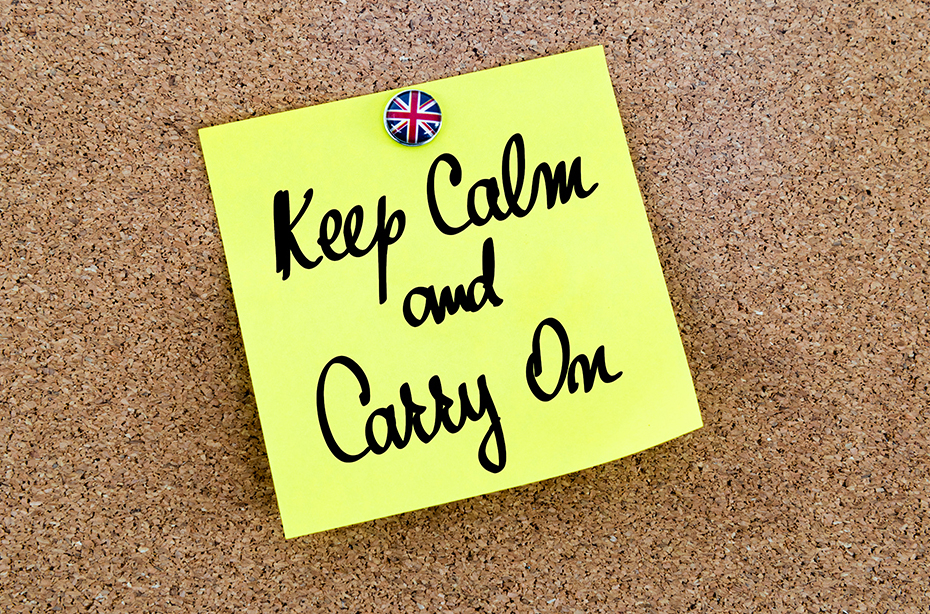Alarm bells may be sounding, but it you can block out the noise and listen to your own inner voice you may have more of a chance of survival.
“There are bad times just around the corner, we can all look forward to despair” crooned the great Noel Coward in 1952, in a song that summed up - and parodied - the gloomy mood of a country that felt it had won the war and lost the peace. The televised coronation of the late Queen Elizabeth II a year later - and the long-awaited end of rationing the year after that - lifted the national mood somewhat. Yet today, having ‘won’ the war against Covid, many of us fear that we are losing the peace again. Fuel poverty, runaway inflation, industrial unrest - it’s as if Britain is, rather like Marty McFly, (aka Michael J. Fox), going back to the future again. The only dispute between pundits seems to be whether we are travelling back in time to the dreary 1970s or the even grimmer 1930s.
As Coward hinted in his classic song - which contains the great couplet “And it’s no use whining about the silver lining” - this has always been the British way. As long ago as 1967, when the country was officially swinging, the renowned explorer Freya Stark warned that Britain was sliding inexorably into mediocre decadence. Her particular beef was that none of the clocks in public spaces told the correct time.
Chiding Stark for her pessimism, the writer Michael Frayn observed that the country had been sliding into decadence ever since commentators first learned how to spell the word. This may well be the real British disease: a sense of foreboding about the future (although to be fair, this is not entirely unjustified, given the state we have so often found ourselves in).
But let’s be honest, would we really want it any other way? America’s relentless boosterism - in which even qualified optimism about the future is regarded as deeply unpatriotic - is not for us. Neither is the bombast of the Germans, the narcissism of the French, the cheery fatalism of the Irish or the nonchalant pessimism of the Italians. Nor is the long view of the Chinese, who judge progress in terms of generations, not years, our kind of thing.
In some ways, the country whose mood closely mirrors ours is Japan. The media insists that the Japanese have suffered from three ‘lost decades’ of stagnation, a narrative that sounds reasonable as long as you don’t visit the place and realise that they take for granted many of the things we worry about - like decent public transport, cheap dining out and a common faith that they have a future (even if they don’t necessarily agree on what that future is).
As the British media does its best to instil a sense of existential crisis, business leaders would be well advised to heed John Kenneth Galbraith, a counsellor of John F. Kennedy’s, and one of America’s most intelligent economists. With the American media twitching about a gloomy day of reckoning to come in the late 1970s, Galbraith was invited onto a prime-time TV news show and, asked to forecast the future, replied: ”We can be fairly certain that almost nothing will happen.”
The media didn’t like this - their revenues depend on their ability to peddle ecstatic highs and emphatic lows - but Galbraith certainly had a point. Most of the time, almost nothing happens, or - if it does happen, it is on a different scale to what is predicted - and British companies in any sector, not just wide-format print, would do well to remember that.
It is true, there are many reasons to be fearful. The headline rate of inflation is alarming, the balance of trade is horrendously unbalanced, real wages are falling and soaring energy bills will erode consumers’ disposable income. That said, unemployment is at a record low - less than 4% at the time of writing - and the British economy, despite some wobbling from quarter to quarter, is still expected to grow slightly this year.
In other words, there’s no need to go all Private Fraser about this and insist that we are all doomed, doomed. Just as nobody foresaw Russia’s invasion of Ukraine, we cannot foresee how it will end - or scale down, which would ease the pressure on the global economy.
The most quoted part of Rudyard Kipling’s famous poem ‘If’ is about treating the impostors of triumph and tragedy with equanimity - and that is certainly good advice for any business leader. Yet, in some ways, the more relevant message is to “trust yourself when all men doubt you - and make allowance for their doubting too.” In other words, base your strategy on what you know, and not on what the media is telling you.


